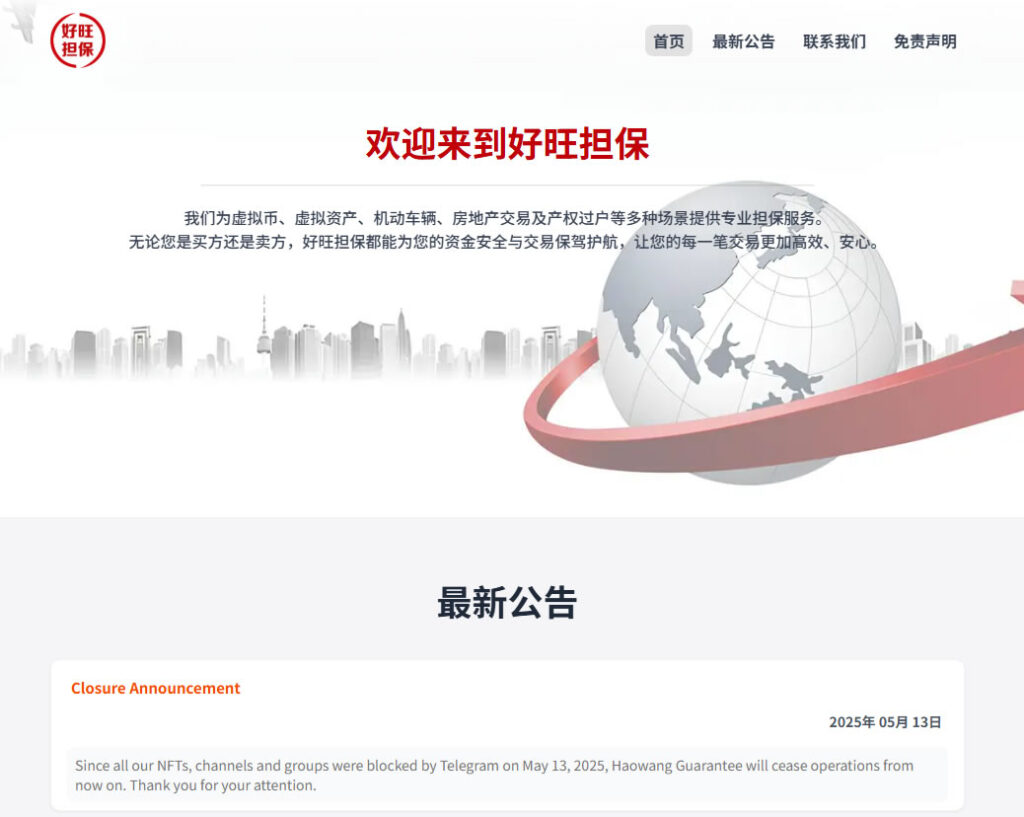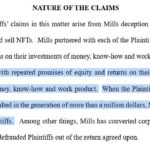A significant development has unfolded in the realm of cryptocurrency and cybercrime, as a major Chinese darknet marketplace, known as Haowang Guarantee, was forcibly shut down by the popular messaging platform Telegram. This marketplace was notorious for facilitating scams and various illicit activities, with estimates suggesting it facilitated a staggering $27 billion in illegal transactions, primarily through the use of Tether (USDT), a commonly used stablecoin.
On May 13, 2025, Telegram took decisive action by banning thousands of accounts that were part of Haowang Guarantee’s infrastructure, rendering the platform inoperable. The marketplace, which was previously known as Huione Guarantee, acknowledged its closure in a notice on its website, stating, “Since all our NFTs, channels and groups were blocked by Telegram, Haowang Guarantee will cease operations from now on.” This statement reflects the extensive crackdown on darknet activities that Telegram has been pursuing, aiming to eliminate criminal networks from its messaging platform.
“Criminal activities like scamming or money laundering are forbidden by Telegram’s terms of service and are always removed whenever discovered,” stated Telegram spokesperson Remi Vaughn.
The implications of this closure are profound. Blockchain security firm Elliptic highlighted that Haowang Guarantee not only served as a hub for crypto scamming but also provided a wide array of services including money laundering, the handling of stolen data for fraudulent schemes, and even deepfake technologies. Elliptic’s co-founder, Tom Robinson, celebrated the shutdown as a “huge win” in the ongoing battle against online fraud, emphasizing its potential impact on reducing the prevalence of such illicit markets.
Adding to the complexities of the situation, the U.S. Treasury’s Financial Crimes Enforcement Network had already designated Haowang Guarantee as a money laundering operation earlier in May, cutting it off from the U.S. banking system. Yet, with the demise of this prominent marketplace, another illicit platform, Xinbi Guarantee, has been identified on Telegram. According to Elliptic, Xinbi is already linked to over $8.4 billion in transactions, showcasing the persistent nature of online illicit marketplaces that continue to thrive despite law enforcement efforts.
These developments shed light on a larger issue: a “China-based underground banking system” that is reportedly centered around stablecoins and cryptocurrency payments, facilitating money laundering on a significant scale. The closure of Haowang Guarantee marks a pivotal moment in the fight against cybercrime and poses both challenges and opportunities for regulators and law enforcement agencies worldwide.
Closure of Major Chinese Darknet Marketplace: Implications for Crypto Crime
The shutdown of the Haowang Guarantee marketplace, linked to significant illicit activities, has wide-reaching implications for online security and crime prevention.
- Marketplace Shutdown:
- Haowang Guarantee was a major player in the darknet facilitating $27 billion in illicit activities.
- Operations ceased following Telegram’s ban on thousands of accounts involved in its infrastructure.
- Impact on Crypto Scamming:
- Used various tools for facilitating scams, including money laundering and stealing personal data.
- This closure is expected to significantly hinder the capabilities of online scammers.
- Regulatory Actions:
- Designated as a money laundering operation by US Treasury’s FinCEN before its shutdown.
- This highlights ongoing efforts to regulate the cryptocurrency landscape and combat illicit use.
- Emergence of New Threats:
- Xinji Guarantee has been identified as a new player with estimated transaction volumes of $8.4 billion.
- Though one marketplace has been shut down, new ones continue to emerge, posing persistent risks.
- Global Implications:
- The shutdown is considered a significant victory against online crime, impacting victims of fraud globally.
- It reflects the increasing scrutiny and action against cybercriminal activities in the cryptocurrency market.
“This marketplace was a key enabler of the global scam epidemic, and I think this will put a real dent in the ability of online scammers to do what they do.” – Tom Robinson, Elliptic Co-founder
Darknet Crackdown: The Shutdown of Haowang Guarantee and Its Implications
The closure of Haowang Guarantee, the colossal Chinese darknet marketplace, signifies a pivotal moment in the battle against cybercrime and crypto scams. This action impacts the shadowy landscape of illegal online transactions, drawing comparisons to previous crackdowns on illicit platforms, such as the takedowns of Silk Road and AlphaBay. Unlike these earlier interventions, however, Telegram’s direct involvement by banning related accounts has created distinct implications for various stakeholders.
Competitive Advantages: This bold move against Haowang Guarantee is a major win for law enforcement and cybersecurity communities, who have long grappled with the rising tide of cryptocurrency-enabled crimes. With the marketplace reportedly facilitating $27 billion in illicit transactions, disrupting this ecosystem may significantly hinder the operations of online scammers, money launderers, and fraudsters. As reported by Elliptic, the closure could fundamentally alter the functionality of underground networks, allowing victims of online fraud to reclaim a sense of safety and perhaps even recover some lost assets through enhanced regulatory scrutiny.
Competitive Disadvantages: Despite the success of this crackdown, the emergence of new platforms like Xinbi Guarantee serves as a clear reminder that the battle against cybercrime is far from over. With an estimated $8.4 billion flowing through Xinbi, it suggests that illicit operations can quickly relocate or rebrand. This fluidity poses ongoing challenges for authorities as they attempt to dismantle complex networks woven through digital currency systems and encrypted communication channels.
This escalating game of cat-and-mouse could create problems not only for the authorities tasked with policing the digital realm but also for consumers who may inadvertently engage with these platforms. As new players emerge, particularly those tied to the extensive Chinese underground banking systems, the risk intensifies for unwary individuals who might find themselves entangled in fraudulent schemes without adequate protection or knowledge of these dangers.
This crackdown could ultimately benefit regulatory agencies, cryptocurrency platforms striving for legitimacy, and victims of scams looking for justice. However, the persistent availability of alternatives such as Xinbi Guarantee suggests that the darknet’s base can quickly adapt. As such, stakeholders must remain vigilant and proactive in addressing this global challenge, leveraging technological advancements while ensuring that users are educated about potential risks in the crypto landscape.

















